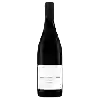
Winery ColruytMorgon Rouge
This wine generally goes well with pork, poultry or veal.
Food and wine pairings with Morgon Rouge
Pairings that work perfectly with Morgon Rouge
Original food and wine pairings with Morgon Rouge
The Morgon Rouge of Winery Colruyt matches generally quite well with dishes of pasta, veal or pork such as recipes of pasta with vongoles (flat clams), tunisian pasta or sauté of veal with olives (corsica).
Details and technical informations about Winery Colruyt's Morgon Rouge.
Discover the grape variety: Voltis
Wine grape variety of the INRA-Resdur1 series with polygenic resistance (two genes for mildew and powdery mildew have been identified), resulting from an interspecific cross, obtained in 2002, between Villaris and Mtp 3159-2-12 (for the latter, one of its parents is Vitis rotundifolia, which is resistant to Pierce's disease, mildew, grey rot, etc.). Little multiplied, it is registered in the Official Catalogue of wine grape varieties list A1.
Informations about the Winery Colruyt
The Winery Colruyt is one of of the world's great estates. It offers 51 wines for sale in the of Morgon to come and discover on site or to buy online.
The wine region of Morgon
Morgon is one of the ten Beaujolais crus located on the slopes of the Beaujolais hills, on the west bank of the Saône. The appellation applies only to red wines made from the Gamay Grape. Some white grapes are allowed in the Final blend: Chardonnay, Aligoté and Melon de Bourgogne. Although there are no officially defined quantities for these varieties, Morgon's blend is controlled by limiting the proportion of these varieties that are allowed in the Vineyard to a maximum of 15%.
The wine region of Beaujolais
Beaujolais is an important wine region in eastern France, famous for its vibrant, Fruity red wines made from Gamay. It is located immediately South of Burgundy, of which it is sometimes considered a Part, although it is in the administrative region of Rhône. The extensive plantings of Gamay in this region make Beaujolais one of the few regions in the world that is so concentrated on a single Grape variety. Pinot Noir is used in small quantities in red and rosé wines, but in the name of regional identity, it is being phased out and will only be allowed until the 2015 harvest.
The word of the wine: Legs
Synonymous with tears.














